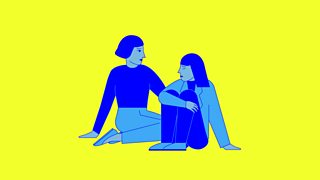PTSD: 'I had to be his crutch, he was a totally broken man'
Post Traumatic Stress Disorder diagnosis rates in the UK military have increased over the past decade. Yet veterans are not the only ones who need support. Research now shows their partners face an increased risk of developing secondary PTSD themselves. Over the past two years, veterans charity has been running workshops across the country to help partners, recently launching the first online treatment programme of its kind in the UK. Woman’s Hour reporter Tamsin Smith has spoken exclusively to three of the women taking part...

“Caring, funny, in for a laugh, interested in others…” 'Sheila', 63, shakes her head as she describes how the man she married four decades ago was always seen by other people. “But with me he was totally disinterested and disengaged. I just thought it was me.” She started to suspect PTSD after he retired from military service 14 years ago. “He was drinking, going out for hours and hours and I didn’t know where he was. He never ever laid a hand to me, but he’s hit many a wall and smashed his hands up.”
When I eventually confronted him, he broke down and cried like a baby. I then had to be his crutch. He was a total broken man.
It can take veterans years to ask for treatment. Last year more than 15,000 calls were made to the Combat Stress helpline, and it’s often partners like 'Sheila', who have to battle and persuade their loved ones to pick up the phone.
When 'Sheila' realised her husband hadn’t been turning up to his part time job she decided to turn detective, following him for several days. “I found him pretending to be someone else, calling himself another name ringing up women, sometimes 20 a day. He was then sitting up on the cliff. It was out of control and I thought, 'this isn’t right'.”
She noted down 10 pages of evidence to prove he needed help. “When I eventually confronted him, he broke down and cried like a baby … I then had to be his crutch. He was a totally broken man.”
However, other partners receive a more hostile reaction when they try to help. 40-year-old mum of two 'Becky' has known her husband since they were teenagers. After a fairytale wedding in an Edinburgh castle, they moved into married quarters where PTSD slowly infiltrated daily life. “If tea towels weren’t in rows, or the coffee and sugar weren’t lined up he’d get really, really angry.” Trips out were ruined by what she now knows to be the symptom of hyper-vigilance. “Every time we even went to the park with the kids he would be constantly risk assessing, registering every person and whether they’ve got a rucksack, then changing our route if he saw the same person twice.’’
That night he had the worst night terror. He was screaming, he was sweating. I tried to wake him and got punched in the face.
The crisis point came years later after his closest military friend tried to take his own life. “That night he had the worst night terror,” 'Becky' remembers, “he was screaming, he was sweating. I tried to wake him and got punched in the face. Even though this experience was frightening, it gave me confidence to stand up to him and say no you can’t argue with this symptom.”
But confronting her husband about the severity of his PTSD backfired. “How dare I suggest he was so weak he would suffer from mental illness? Have I got no respect for him at all? To him that was like saying he’s not a soldier. That’s his identity, and how dare I try and take that away?" Becky says he was so disgusted with her suggestion he needed help, “he left the house and went on a two to three week binge-drinking downward spiral, and broke every marriage vow we ever took together.”
It was a lonely time. None of her friends understood the effect PTSD was having on her husband’s behaviour. “A lifelong friend called me up and said, ‘I never had you down as one of those pathetic women that supports their husbands doing all sorts’.”
Pressure from family and military friends eventually brought him home to admit he needed help. But by this point, Becky was suffering too. In a survey of UK partners living with treatment-seeking veterans, 17% presented with symptoms of secondary PTSD themselves and over a third reported problems with anxiety and depression. (Source: Journal of Epidemiology and Public Health Reviews 2016)
“I was sick with stress, angry and isolated. I couldn’t even have a cry as it made his PTSD worse. Living with someone who is suicidal isn’t easy, especially when you have children. I was hyper-vigilant myself at home, making sure no medicines were left around, always risk-assessing.”
When 'Becky' went on the Combat Stress programme for partners, not only did she find people who understood, but she was given help that she says has changed her life. She was advised to go home and talk to her husband about his suicide plan, and make sure a phone call to her became part of his preparations. “Once he agreed to this, the stress just left. I can go out and have a cup of tea with my mum or watch my daughter’s assembly and not be terrified I’m going to come back and find him dead on the floor.”
Evidence suggests that only a minority of partners seek support for themselves as there are still many barriers, including carer responsibilities and judgement from others.
'Elaine', 59, hoped that retirement would bring travel and new adventures. But this all changed in 2015 when her breast cancer diagnosis triggered her husband’s PTSD, 28 years after he’d left military service.
“He was so determined to look after me and he did an amazing job getting me to all my appointments, but I could see his mental health suffering. It was the hardest time in our lives.” Later when her husband started expressing thoughts about wanting to hurt her, he was hospitalised for four weeks. 'Elaine' struggled with depression, anxiety and isolation. She still remembers the reaction from her closest friend. “She asked me if I’d have known back then what I know now, would I still have married him? In a heart-beat I said 'yes'. PTSD is an illness. I don’t think she’d have asked my husband – if he’d known I’d get cancer, would he still have married me?”
All three interviews feature in our new three part series about the partners of veterans suffering with PTSD. Woman's Hour is on ±«Óãtv Radio 4 at 10am on weekdays and 4pm on Saturdays. Listen to all episodes whenever and wherever you like on ±«Óãtv Sounds.



